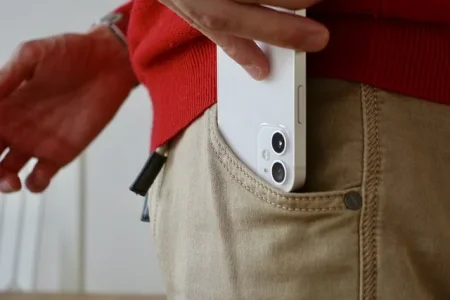In recent events, Apple's iPhone 12 has come under scrutiny in France due to alarming radiation emission levels. The French regulatory authority, ANFR (Agence Nationale des Fréquences), has diligently tested various mobile devices to ensure they adhere to radiation safety standards. While other iPhone models remain available, the iPhone 12's conspicuous absence on the French Amazon platform has ignited concerns about its safety.

Image Credit: Lukas Gehrer
The iPhone 12 underwent rigorous testing at the CTC Advanced lab in Saarbruecken, Germany, under the supervision of ANFR. The findings were unsettling, revealing that the device surpassed the acceptable radiation thresholds, prompting its temporary removal from the French market. It's worth noting that the iPhone 12 was among 141 phones evaluated by the agency.
All mobile phones emit a specific type of electromagnetic radiation termed RF (radio frequency). The real issue arises when the radiation levels exceed what is deemed safe. ANFR's evaluation measures the energy transferred to human tissue due to the phone's radiation, quantified in watts per kilogram (W/kg). Alarmingly, the iPhone 12 registered a reading of 5.74 W/kg in one of the tests, marking a significant 43% above the allowed maximum.
However, the spotlight isn't solely on the iPhone 12. Other renowned brands, including Motorola and Samsung, have encountered similar challenges. Phones like the Motorola Edge and Xiaomi Poco X3 have failed to meet the stringent French radiation criteria.
While the iPhone 12's radiation concerns have garnered widespread attention, it's crucial to delve deeper into the matter. RF radiation is an inevitable byproduct of contemporary electronics, and the components responsible for these emissions are prevalent in various phone models. For instance, the Qualcomm X55 5G modem, a common component, is integrated into several leading phones, including the Samsung Galaxy S20 Ultra.
The discourse on the potential health implications of RF radiation needs to be clarified. The World Health Organization, in 2014, asserted that mobile phone usage hasn't been conclusively linked to adverse health effects. However, subsequent studies have indicated potential risks, especially with extended exposure.
In response to the ban, Apple has announced its intention to release a software update tailored for French users to align with the country's testing protocol. They have emphasised that this move pertains to the specific testing methodology and does not indicate a broader safety issue.

Image Credit: Lukas Gehrer
The iPhone 12 underwent rigorous testing at the CTC Advanced lab in Saarbruecken, Germany, under the supervision of ANFR. The findings were unsettling, revealing that the device surpassed the acceptable radiation thresholds, prompting its temporary removal from the French market. It's worth noting that the iPhone 12 was among 141 phones evaluated by the agency.
All mobile phones emit a specific type of electromagnetic radiation termed RF (radio frequency). The real issue arises when the radiation levels exceed what is deemed safe. ANFR's evaluation measures the energy transferred to human tissue due to the phone's radiation, quantified in watts per kilogram (W/kg). Alarmingly, the iPhone 12 registered a reading of 5.74 W/kg in one of the tests, marking a significant 43% above the allowed maximum.
However, the spotlight isn't solely on the iPhone 12. Other renowned brands, including Motorola and Samsung, have encountered similar challenges. Phones like the Motorola Edge and Xiaomi Poco X3 have failed to meet the stringent French radiation criteria.
While the iPhone 12's radiation concerns have garnered widespread attention, it's crucial to delve deeper into the matter. RF radiation is an inevitable byproduct of contemporary electronics, and the components responsible for these emissions are prevalent in various phone models. For instance, the Qualcomm X55 5G modem, a common component, is integrated into several leading phones, including the Samsung Galaxy S20 Ultra.
The discourse on the potential health implications of RF radiation needs to be clarified. The World Health Organization, in 2014, asserted that mobile phone usage hasn't been conclusively linked to adverse health effects. However, subsequent studies have indicated potential risks, especially with extended exposure.
In response to the ban, Apple has announced its intention to release a software update tailored for French users to align with the country's testing protocol. They have emphasised that this move pertains to the specific testing methodology and does not indicate a broader safety issue.




